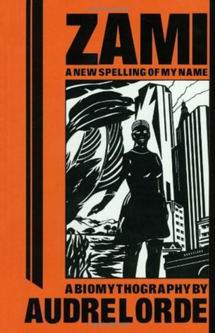ZAMI is a fast-moving chronicle. From the author's vivid childhood memories in Harlem to her coming of age in the late 1950s, the nature of Audre Lorde's work is cyclical. It especially relates the linkage of women who have shaped her . . . Lorde brings into play her craft of lush description and characterization. It keeps unfolding page after page. --Off Our Backs
The biomythography, Zami: A New Spelling of My Name, traces Audre Lorde's life from her childhood in Harlem through her discovery and acceptance of her self as a Black, lesbian woman in the late 1950's. Masterfully crafted by the profound and artistic Lorde, Zami reads like musical poetry. Through her life experiences, Lorde carefully forges a path to locate her position in the world. Ultimately, naming and accepting difference are the tools necessary for Lorde's ability to stay alive and stay human. –Gay and Lesbian Review
Gender Studies Book Club

February 13, 2015
Noon—1:00pm
339 O’Shaughnessy
Open to Students, Faculty, and Staff
FREE COPIES
to first 10 to sign up
Email Gender@nd.edu
Discussion Leader: Z’etoile Imma, . Assistant Professor, Department of English
Z’étoile Imma’s most recent work explores gender and sexuality in contemporary Anglophone African literature, film, and new media; African feminisms; postcolonial queer studies; and African city studies. Due to her interest in spatial epistemologies, with the support of the Mellon Mays Fellowship and numerous travel grants, she has engaged in literary-critical fieldwork in Ghana, Benin, South Africa, Zimbabwe, Nigeria, Senegal, The Gambia, and Eritrea. Her book manuscript Intimate Men/Intimate Spaces argues that Anglophone African women writers, filmmakers, and new media producers employ and emphasize spatial tropes in their texts to redefine and re-imagine African masculinities in the postcolony. Imma is currently developing her second project, Love Stories from Africa, in which she considers how representations of love and urban desire in emergent African literary and visual texts interrupt long-standing local and global discourses on African bodies, spaces, sexualities, and gender, as well as, challenge increasingly pervasive homonationalist ideologies. Alongside her scholarly work, Imma, a Cave Canem affiliate, continues to write creatively and has published poems in African Voices, ShadowBox, and The Brooklyn Review.